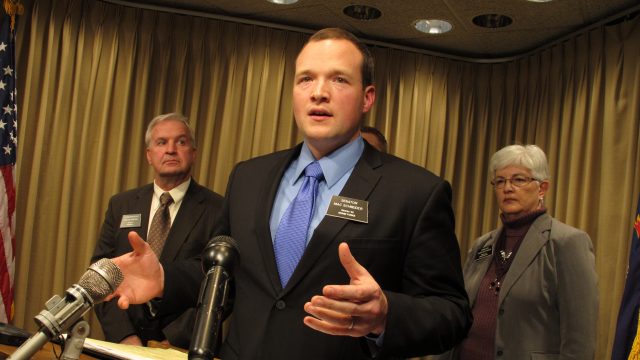North Dakota Democrats Still Wrong About The Oil Tax Trigger

During the Legislative session earlier this year lawmakers were concerned, in a big way, about falling oil prices and the impact that would have on tax revenues. Ours is a state that budgets on revenue projections, and falling oil prices wouldn’t just hit direct taxes on oil activity. Less oil activity means less hiring and less commerce which, in turn, means less sales and income tax revenue.
One hedge lawmakers made against oil price volatility was to replace tax exemptions triggered by low oil prices (triggers which could have prompted major swings in state revenues) with a flat 11 percent oil extraction/production tax that falls to 10 percent when oil prices are under $90 per barrel.
But earlier this summer oil prices saw something of a turnaround, and the state (barely) missed the dreaded “big trigger” oil tax exemption. Democrats were quick to make political hay. “The non-activation of the trigger is just further affirmation that the Republican majority’s decision to ramrod through their massive oil tax cut in less than a week during the final days of the legislative session was never about avoiding that temporary tax incentive,” Democrat legislative leaders Kenton Onstand and Mac Schneider wrote in a truly bombastic editorial after the trigger failed to hit. “It was about dramatically reducing the oil extraction tax for senseless ideological reasons that are diametrically opposed to the best interests of North Dakotans, both present and future.”
Unfortunately for Democrats, the real world is once again proving inconvenient for their talking points. They accuse Republicans of having “senseless ideological reasons” for being rid of the oil tax trigger, but with oil prices tanking once again it becomes clear that Republicans had very good, and very real reasons to pass the reforms they did.
The price to invoke the “big trigger,” which would eliminate the oil extraction tax entirely, is $55.09. The price of West Texas Intermediate crude oil this morning was $52.99. What’s worse, futures for WTI crude are currently trading below the trigger price for August, September, October, November, December, and January (screenshot taken at the time of publication).
Obviously these prices are in flux. Oil prices might not actually be anywhere near these prices. They could be signicantly lower. They could be significantly higher. That’s the point. We don’t know.
What we do know is that, in July of 2015, it’s only possible for North Dakota’s oil tax triggers to hit in December and that could only happen if the average prices for July, August, September, October, and November are below the trigger price. And even if the trigger did hit in December it would last exactly one month until the oil tax reforms passed by Republicans kicks in on January 1st.
If the oil taxes hadn’t been reformed earlier this year, who knows how long the trigger could have been in place and what impact it would have on our budgets?
Democrats want to scream and howl about how that oil tax reform was some sort of a handout to big oil against “the best interests of North Dakotans, both present and future,” to quote Schneider and Onstad again. But that’s demonstrably untrue. The oil markets remain volatile and unstable, but one thing North Dakotans don’t have to worry about again is the oil tax triggers through our state’s finances into chaos.
That has been fixed, no thanks to Democrats who opposed the common sense reform for, if I may again borrow from Schneider and Onstad, “senseless ideological reasons.”





